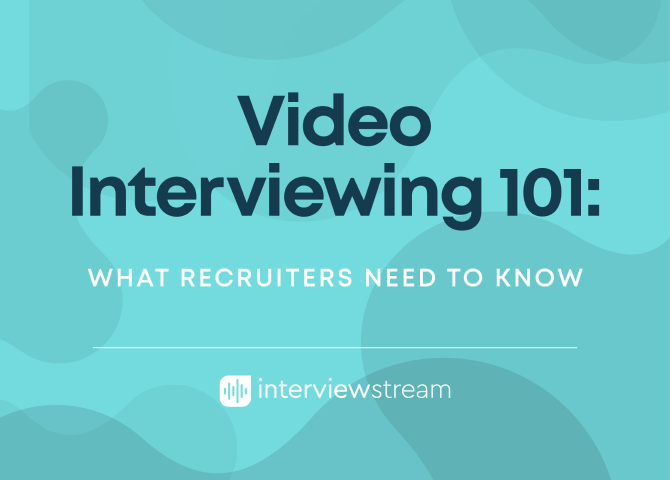2024 Hiring Challenges and Projections for Every Industry

The rundown
- After years of volatility, turnover rates have returned to pre-pandemic levels, and both workers and employers would like to keep them that way.
- We’re in an artificial intelligence boom. In fact, almost everyone is using AI by now, from job searching and recruiting to onboarding and everyday work.
- While remote work hasn’t gone away, hybrid workplaces are the latest trend and it’s a grand experiment for many industries.
Table of contents
- Hiring and Recruitment in 2024: What to Expect
- K-12 Education
- Higher Education
- Finance
- Government
- Healthcare
- Insurance
- Manufacturing
- Retail
- Staffing and Recruiting
- Technology
- Final Thoughts
- About interviewstream
Hiring and Recruitment in 2024: What to Expect
The COVID-19 pandemic and its impacts had a ripple effect on the economy for at least three years, but now, it appears that we are settling back into—say it with us! —another “new normal.”
Following the rapid hiring of 2020, the Great Resignation of 2021, and the volatility and spike in layoffs that marked 2022, 2023 was a regrouping year for many industries searching for stability and conservative spending in an unpredictable economic environment.
As of the end of 2023, turnover rates have returned to pre-pandemic levels and layoff rates have mostly bottomed out. In 2024, we expect both employers and employees to want to hold onto that stability as less-than-ideal economic circumstances continue to play out.
What’s Coming Next
In addition to that desire for stability, 2024 will see many companies push for hybrid work (or even stricter return-to-office mandates). Remote work is here to stay for many industries, but as real estate costs and other pressures become more intense now that the pandemic is over, many companies want to see people back in offices again—at least part of the time.
Other segments, such as manufacturing and healthcare, have seen employment rise and demand for skilled workers remain high. As inflation cools and new legislation supports some of these spaces, there’s a strong year ahead.
Across the board, the interest in and use of artificial intelligence was an unmissable trend in 2023—and this year, as those tools continue to mature and more tech companies integrate generative AI and other in-demand features into their offerings, AI adoption will be key for many of us.
Here’s what else recruiters across industries should know as they head into 2024 and fine-tune their hiring strategies for the year.
K-12 Education
Teacher and staff shortages have, sadly, been a common refrain for districts and schools around the country over the last few years. In addition to vacancy issues in specific areas and subjects, teachers taking jobs for which they are overqualified is a common occurrence. And with declining student enrollment in many districts, it’s difficult to predict how job openings will align to district and student needs in the coming years—especially since data reporting is inconsistent across different locations. It’s not an easy time to be in education.
Projection: While some of the statistics are grim, some researchers suspect that teacher turnover may have already spiked and are hopeful it will trend down in the next year or two. Without doubt, specialized teachers will continue to stay in demand this year—including those in STEM and special education. Districts and schools will also need to get creative with funding, and use new tech to help support busy educators and staff.
Higher Education
Similar to younger grades, higher education is under a lot of pressure to adapt to a changing world and will continue to grapple with it in 2024. Tuition costs are under especially close scrutiny, as student loan forgiveness plans have become less and less likely—and enrollment in many institutions remains lower than previously. With pandemic aid ending and consumer expectations so different than they were just five years ago, colleges and universities must find ways to innovate in the coming years—or fail.
Projection: There’s reason for some optimism in higher ed, as enrollment rates tend to rise with shaky economies. Creative institutions can lure both staff and students with fresh takes on technology, learning styles, and support services that can differentiate them from other institutions. For example, more of these organizations may lean on tech to streamline operational efficiencies, explore continuing education programs for adults, and partner with other companies and professional organizations to offer outside-the-classroom learning opportunities like apprenticeships.
Finance
All this talk about seeking stability in a still-unpredictable economic landscape bodes well for some players in the financial world, especially accountants. According to a recent report from Robert Half, financial planning and analysis professionals are highly in demand as we head into 2024—and overall, unemployment rates in finance and accounting sectors are significantly below the national average.
Projection: Companies who seek to bring in more talent and know-how with hires in this space may choose to do so conservatively this year, by relying on contract hires in a bigger way. This is also one industry that may continue to allow remote or at least hybrid work, as flexibility is seen as a lucrative benefit that is highly desired by many of these in-demand professionals. Companies with roles to fill may do well to differentiate their benefits this way.
Government
Public sector hiring is always at the mercy of politics—be they local, state, or federal—and the last year has been no exception. According to Indeed, federal job postings were down 22.5% in November 2023 from a December 2021 peak. Fortunately, much of this decline can be attributed to successful fills of jobs that had long remained open.
Projection: Office of Personnel Management Director Kiran Ahuja said in December of 2023 that the agency is “fundamentally rethinking hiring in government.” He was referring to pool hiring, which enables multiple federal agencies to recruit from a single job announcement. Efficiencies like these are going to be on trend for public sector hiring teams this year, as they seek—as always—to do more with less funding, time, and headcount than they might like.
Healthcare
Fast Company reported that, as 2023 came to a close, hospital unemployment rates were at an extremely low 1.4% in the final months of the year. Burnout remains a challenge contributing to attrition among nurses and physicians, and healthcare companies are under pressure to get creative in recruiting and retaining these essential care providers.
Projection: Still seeking to fill positions and provide speedy care for patients, many healthcare companies are building their in-house recruiting teams to specialize in this talent market. Additionally, the sustained popularity of telehealth options may enable these organizations to offer work-life friendly hybrid arrangements to new hires. These teams, too, will lean on technology to streamline processes and create new efficiencies in 2024.
Insurance
While the seemingly increased prevalence of natural disasters can be a strain on the insurance industry, it does promise ongoing demand for their services—and motivation to become more efficient. A key component of that innovation will come from data analytics exercises, helping insurers fine-tune their calculations and price their products accurately and reliably.
Projection: Though some major insurers experienced layoffs last year, most players in this industry expect to grow their revenue in 2024—and they’ll need the right people to help them do it. Whether they’re looking to enter new markets or meet growing demands, some big trends for insurance talent seekers this year will rest in data analytics skills, customer-centric mindsets, and tech savviness. Additionally, many insurers would be wise to upskill their current workers to meet evolving strategies and stay ahead of recruiting competition.
Manufacturing
Deloitte’s 2024 outlook for the manufacturing industry is focused on two key themes: embracing technology and improving talent attraction, retention, and upskilling strategies. Supply chain challenges that have run rampant since the pandemic have improved, but some issues still linger. Additionally, public funding and demand for climate-friendly innovations are coaxing many organizations into exploring new ways of working toward a net-zero future state.
Projection: Talent is a persistent roadblock for manufacturing firms looking to learn and grow. Many are adapting to the current workforce by exploring more flexibility in areas like scheduling, helping to attract more production talent, as well as examining benefits like pay and other perks. Manufacturers who want to remain competitive in the coming years are also deep into a digitization journey by now, either hiring or upskilling tech-savvy teams who can help optimize supply chains, automate operations, and ensure cybersecurity.
Retail
Retail is another industry with very low layoff rates toward the end of 2023, and many economists were pleased to see holiday spending back to pre-pandemic levels as the year came to a close. This was surprising to many analysts, especially as it coincided with the resumption of federal student loan payments.
Projection: While there’s plenty of reason to have a positive outlook on retail health in 2024, these companies are still feeling the push to meet evolving consumer demands. For example, data privacy is a growing expectation, and retailers will need to onboard the professionals who can prove their cybersecurity and data ethics chops in many areas, including marketing. An increased focus on social savviness and creative thinking will be crucial in this sector as companies seek to innovate and impress potential customers, especially as inflation makes people more choosy with their purchases.
Staffing & Recruiting
With the dramatic shift from high voluntary turnover rates to notable stability in 2023, recruiters and HR professionals were impacted by layoffs at an outsized rate compared to other teams. Indeed, as the economy stood on the precipice of a possible recession early last year, many companies chose a conservative path with hiring and shed recruiting talent as a reflection of that choice. But things are changing, and the situation is looking up for recruiters in many industries.
Projection: Over the next year, according to Forbes, 61% of companies expect to increase their investments in recruiting and HR. Much of this added budget will go into useful recruiting tech, particularly that with a focus on AI-powered efficiencies and analytics. Staffing agencies and recruiters who hone their technical skills, refine their expertise to niche areas, and present data-minded strategies are likely to have a leg up on the competition as companies seek to grow these functions in the smartest ways possible.
Technology
The technology sector may have been the most notable contrast between layoffs and stability in 2023, as the year opened on a grim note and leveled out significantly in the months that followed. After headcount reductions and hiring freezes, many major players in this space were vocal about their focus on strategic growth as they opened more roles later in the year. Many expect that the tech world has stabilized for a good stretch and, fueled by a fever pitch of interest in generative AI, are looking for new ways to grow in 2024.
Projection: For tech workers, there are still job openings out there—and in a world of RTO mandates and ongoing inflation, the two most attractive benefits are flexible/remote work and generous pay. When only 28% of tech workers who’ve been called back to the office say their employers make the commute worthwhile, those who offer greater flexibility may attract them to new roles even amidst lower turnover rates. Additionally, investments in AI will continue to skyrocket this year—and talent will be stiff for the people who can help companies deliver on promises made to those investors.
Final Thoughts
The last few years have been one sort of disruption after another, and it’s no surprise that the economy, employers, and employees are all ready for a lot more stability in 2024.
Still, professionals across sectors know that we must all “innovate or die”—and with some very recent lessons on smart, strategic growth in mind, they’re moving forward with big ideas on how to make the most of the opportunities that lie ahead.
About interviewstream
interviewstream is an industry leading recruiting software company that helps you throughout every stage of the hiring process. Our customers have completed over 3 million interviews using interview on demand, interview scheduler, interview connect, AI Recruiting Assistant, and interview insights – and we’d love to help you increase your hiring effectiveness and efficiency. Talk to an expert today to learn how to get started.
The interviewstream platform
Speak to an expert today to learn how our remote interviewing solutions make hiring more effective.
About interviewstream
interviewstream is an HR technology company that exists to help recruiters and hiring teams simplify every stage of the hiring process. Using our video interviewing platform, interview scheduling tools, AI Recruiting Assistant, advanced analytics, and onboarding tools your team can enhance the efficiency and effectiveness of every stage of your hiring process – from screening to new employee training.



